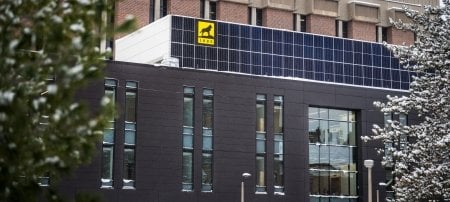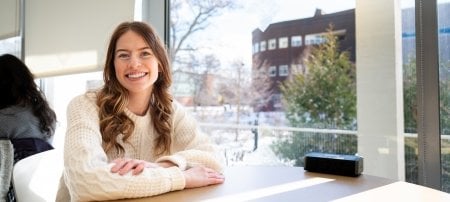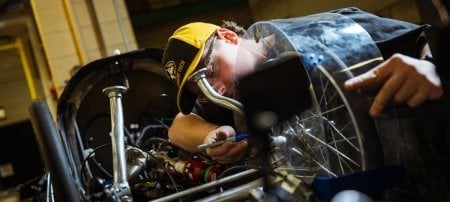For the eighth year, Michigan Tech's Office of the Vice President for Research led
a trip to Washington D.C. It's one of the few times a year that faculty get to eat
sushi, ride public transportation that doesn't shut down by 5:00 p.m. and, you know,
do important things like meet with National Science Foundation program officers.
Always timed after the spring semester ends, The D.C. Trip as it's called, is an opportunity for research faculty to make connections with funding agency program officers. While all early-career faculty are strongly encouraged, the D.C. Trip is open to all faculty.
Team of Tech faculty in DC got advice to push the frontiers of their field forward @mturesearch
— Adrienne Minerick (@aminerick) May 12, 2016
Faculty are encouraged to pack as much “face time” into their schedules. Whether it’s sitting in presentation-style meetings with the entire group or walking into individual meetings with program officers, having a good showing of Michigan Tech people in Washington D.C. carries a lot of value.
Let's face it, communicating via technology is great and eliminates the needs to travel as often. But this trip is incredibly beneficial to the researchers and for Michigan Tech. By participating in this trip, each participant is establishing and strengthening their reputation. Each time a researcher submits a proposal to a funding agency, they get their name out there. This is not an easy thing to do through a piece of paper or email. In person, though, all our human interpersonal skills can pick up on excitement and sincerity. Meeting face-to-face with a program officer gives the researcher an opportunity to make a personal impression. In addition, Michigan Tech's credibility as a research institution strengthens with each trip.
@mturesearch @michigantech Optimism. "If you want to do important work you must work on important problems" #whyilovemyjob #dctrip2016
— Jeremy Bos (@jpbos) May 10, 2016
Valuable connections are not only made with the funding agencies but between the Michigan Tech colleagues as well. The amount of connection and camaraderie faculty find with each other is often a surprise.
Many renowned scientists, engineers, and thinkers have described the lightning moment when a solution to a hard problem becomes clear. That moment can often happen away from the problem while you are doing an unrelated activity or using a different region of the brain. So here's to solving important problems.
After Monday's #DCTrip2016 meetings, @michigantech research faculty stopped at the #renwickgallery. #sciart pic.twitter.com/IsQt39V20G
— MTU Research (@mturesearch) May 11, 2016
D.C. Trip 2016 by the Numbers:
30 people, including 20 assistant professors, one associate professor, one full professor, one dean, one associate dean, and six staff, participated in the D.C. Trip this year.
17 departments were represented including biological sciences, biomedical engineering, civil and environmental engineering, chemistry, cognitive and learning sciences, kinesiology and integrative physiology, electrical and computer engineering, geological and mining engineering and sciences, library, mathematics, mechanical engineering-engineering mechanics, mechanical engineering technology, materials science and engineering, physics, school of forest resources and environmental sciences, College of Engineering administration, and the vice president for research.
15 participants had about 40 individual meetings with directors, managers, and officers.
Faculty engaged face-to-face with 13 funding agencies including National Science Foundation (NSF), National Institutes of Health (NIH), U.S. Department of Defense (DOD), U.S. Department of Energy (DOE), National Institute for Standards and Technology (NIST), Office of Naval Research (ONR), U.S. Agency for International Development (USAID), U.S. Forest Service (USFS), U.S. Department of Transportation (DOT), National Cancer Institute (NCI), Army Research Lab (ARL), and Naval Surface Warfare Center (NSWC).
Michigan Technological University is a public research university founded in 1885 in Houghton, Michigan, and is home to more than 7,000 students from 55 countries around the world. Consistently ranked among the best universities in the country for return on investment, Michigan’s flagship technological university offers more than 120 undergraduate and graduate degree programs in science and technology, engineering, computing, forestry, business and economics, health professions, humanities, mathematics, social sciences, and the arts. The rural campus is situated just miles from Lake Superior in Michigan's Upper Peninsula, offering year-round opportunities for outdoor adventure.






Comments